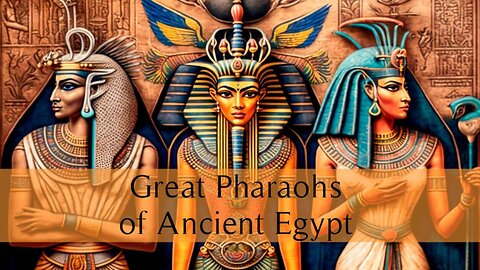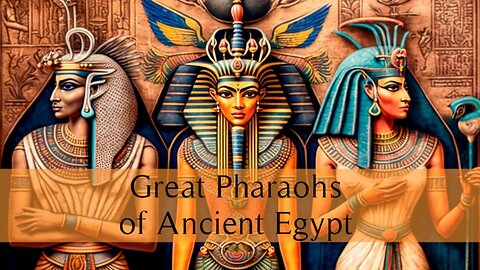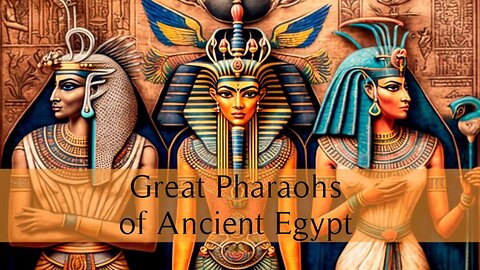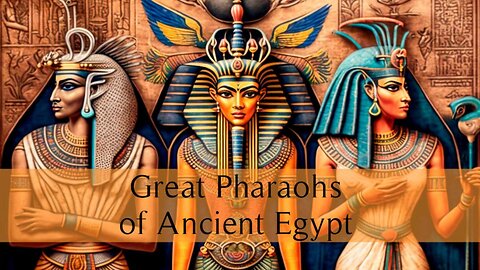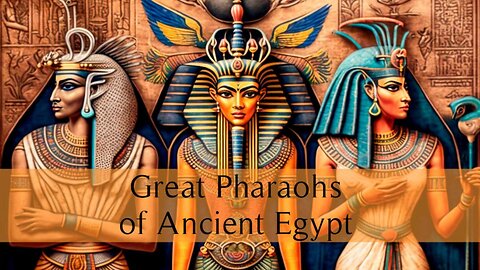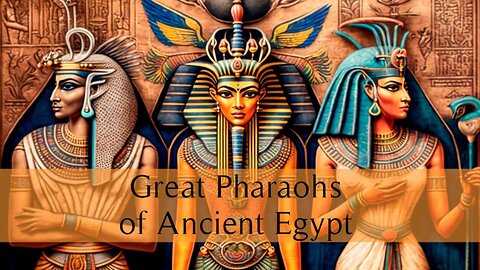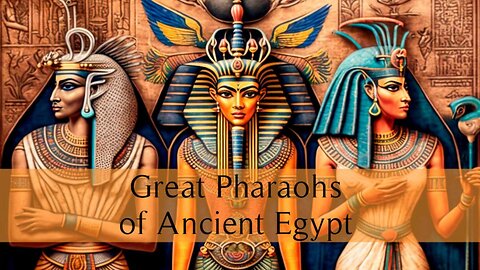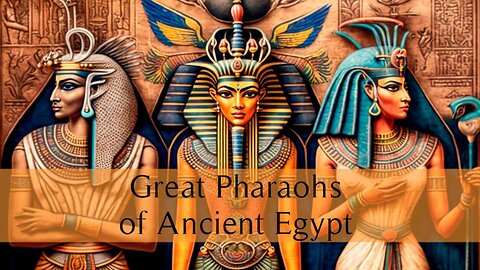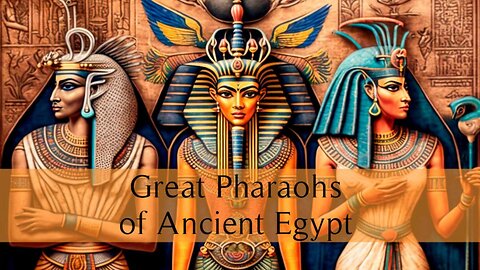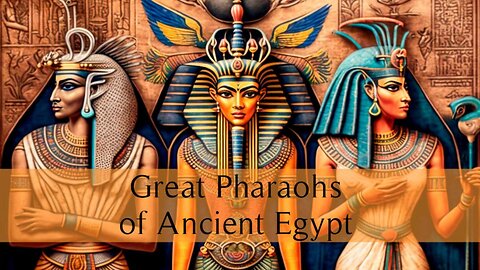
-
Great Pharaohs of Ancient Egypt | King Narmer: The Unification of Egypt (Lecture 1)
 The Great Courses12 lectures, 30 minutes/lecture Taught by Bob Brier, Ph.D. Professor of Egyptology, Long Island University This is an introductory course for anyone interested in ancient Egyptian civilization. By presenting this history in terms of the lives of its rulers, it should be easy to assimilate and difficult to forget. We will not worry much about dates—everyone forgets them anyway. Rather, we will trace the rise of Egypt from a scattering of villages along the Nile to the greatest power the world had ever seen, through the lives of the pharaohs. Egypt ruled the Near East because of its great kings and queens. As the world’s first nation, Egypt’s power was concentrated in the hands of a single person, the pharaoh. If the pharaoh decided a pyramid should be built, it was built. Because of this political structure, the nation could do great things—if it had the right ruler. This course will be a kind of People magazine set in ancient Egypt. By recounting the lives and accomplishments of the great leaders of Egypt, we will present a history of the country spreading over 30 centuries, covering all aspects of ancient Egyptian life. We will begin with Narmer, the first king of unified Egypt, and through his reign, we will show how the seeds of Egypt’s greatness were sown around 3200 B.C. We will see how the government influenced food production and how the people of Egypt benefited for the next 30 centuries. Lecture 1: We begin by meeting the pharaohs we will discuss in this course and defending our approach to studying Egyptian history, that is, to look at history through the lives of great individuals, rather than to analyze events and circumstances. We then discuss what Egypt was like before kingship, and we see Egypt become the first nation in history. We also consider the first historical document in the world—the Narmer Palette. From the time of the unification of Upper and Lower Egypt by King Narmer, it would take only a few hundred years to build a power that would dominate the Near East for thousands of years. We show how the political structure of ancient Egypt made this possible and how the Narmer Palette tells the story. Essential Reading: Michael Rice, Egypt’s Making, chapter 3. Supplementary Reading: Peter Clayton, Chronicle of the Pharaohs, pp. 14–19. Lecture 2: https://rumble.com/v6ywwcq-great-pharaohs-of-ancient-egypt-sneferu-the-pyramid-builder-lecture-2.html87 views 1 comment
The Great Courses12 lectures, 30 minutes/lecture Taught by Bob Brier, Ph.D. Professor of Egyptology, Long Island University This is an introductory course for anyone interested in ancient Egyptian civilization. By presenting this history in terms of the lives of its rulers, it should be easy to assimilate and difficult to forget. We will not worry much about dates—everyone forgets them anyway. Rather, we will trace the rise of Egypt from a scattering of villages along the Nile to the greatest power the world had ever seen, through the lives of the pharaohs. Egypt ruled the Near East because of its great kings and queens. As the world’s first nation, Egypt’s power was concentrated in the hands of a single person, the pharaoh. If the pharaoh decided a pyramid should be built, it was built. Because of this political structure, the nation could do great things—if it had the right ruler. This course will be a kind of People magazine set in ancient Egypt. By recounting the lives and accomplishments of the great leaders of Egypt, we will present a history of the country spreading over 30 centuries, covering all aspects of ancient Egyptian life. We will begin with Narmer, the first king of unified Egypt, and through his reign, we will show how the seeds of Egypt’s greatness were sown around 3200 B.C. We will see how the government influenced food production and how the people of Egypt benefited for the next 30 centuries. Lecture 1: We begin by meeting the pharaohs we will discuss in this course and defending our approach to studying Egyptian history, that is, to look at history through the lives of great individuals, rather than to analyze events and circumstances. We then discuss what Egypt was like before kingship, and we see Egypt become the first nation in history. We also consider the first historical document in the world—the Narmer Palette. From the time of the unification of Upper and Lower Egypt by King Narmer, it would take only a few hundred years to build a power that would dominate the Near East for thousands of years. We show how the political structure of ancient Egypt made this possible and how the Narmer Palette tells the story. Essential Reading: Michael Rice, Egypt’s Making, chapter 3. Supplementary Reading: Peter Clayton, Chronicle of the Pharaohs, pp. 14–19. Lecture 2: https://rumble.com/v6ywwcq-great-pharaohs-of-ancient-egypt-sneferu-the-pyramid-builder-lecture-2.html87 views 1 comment -
Great Pharaohs of Ancient Egypt | Sneferu: The Pyramid Builder (Lecture 2)
 The Great CoursesLecture 2: This lecture presents the founder of the “Fabulous 4th” Dynasty, Sneferu. Before we meet him, however, we look at the history of burials and pyramid building in Egypt. We then turn to Sneferu’s reign, which saw three major innovations: (1) By trial and error, true pyramid construction began; (2) Egypt became an international power through trade with Lebanon and armed expeditions sent to the turquoise mines in the Sinai; and (3) artistic standards were established that would last for thousands of years. We close by noting that Sneferu is the first individual in history about whom we have some personal information: Legend reveals that he was an approachable, sympathetic king. Essential Reading: I. E. S. Edwards, The Pyramids of Egypt, chapters 2 and 3. Lecture 3: https://rumble.com/v6ywwz8-great-pharaohs-of-ancient-egypt-hatshepsut-female-pharaoh-lecture-3.html81 views
The Great CoursesLecture 2: This lecture presents the founder of the “Fabulous 4th” Dynasty, Sneferu. Before we meet him, however, we look at the history of burials and pyramid building in Egypt. We then turn to Sneferu’s reign, which saw three major innovations: (1) By trial and error, true pyramid construction began; (2) Egypt became an international power through trade with Lebanon and armed expeditions sent to the turquoise mines in the Sinai; and (3) artistic standards were established that would last for thousands of years. We close by noting that Sneferu is the first individual in history about whom we have some personal information: Legend reveals that he was an approachable, sympathetic king. Essential Reading: I. E. S. Edwards, The Pyramids of Egypt, chapters 2 and 3. Lecture 3: https://rumble.com/v6ywwz8-great-pharaohs-of-ancient-egypt-hatshepsut-female-pharaoh-lecture-3.html81 views -
Great Pharaohs of Ancient Egypt | Hatshepsut: Female Pharaoh (Lecture 3)
 The Great CoursesLecture 3: One of the greatest individuals in Egyptian history, Hatshepsut appears in no official record. We trace her biography from her marriage at the age of 12 to her half-brother, Tuthmosis II, to her death as “King of Upper and Lower Egypt.” We see how a woman handled the three ways in which a king was supposed to distinguish himself: building, waging war, and undertaking trading expeditions. After examining her three major achievements—her temple at Deir el Bahri, the trading expedition to Punt, and the erection of two great obelisks—we discuss why her name was systematically erased from Egyptian records. We also examine her relationship with Senenmut, the commoner who may have been her lover. Essential Reading: Joyce Tyldesley, Hatchepsut. Supplementary Reading: Aidan Dodson, Monarchs of the Nile, chapter IX. Lecture 4: https://rumble.com/v6ywxoy-great-pharaohs-of-ancient-egypt-akhenaten-heretic-pharaoh-lecture-4.html75 views
The Great CoursesLecture 3: One of the greatest individuals in Egyptian history, Hatshepsut appears in no official record. We trace her biography from her marriage at the age of 12 to her half-brother, Tuthmosis II, to her death as “King of Upper and Lower Egypt.” We see how a woman handled the three ways in which a king was supposed to distinguish himself: building, waging war, and undertaking trading expeditions. After examining her three major achievements—her temple at Deir el Bahri, the trading expedition to Punt, and the erection of two great obelisks—we discuss why her name was systematically erased from Egyptian records. We also examine her relationship with Senenmut, the commoner who may have been her lover. Essential Reading: Joyce Tyldesley, Hatchepsut. Supplementary Reading: Aidan Dodson, Monarchs of the Nile, chapter IX. Lecture 4: https://rumble.com/v6ywxoy-great-pharaohs-of-ancient-egypt-akhenaten-heretic-pharaoh-lecture-4.html75 views -
Great Pharaohs of Ancient Egypt | Akhenaten: Heretic Pharaoh (Lecture 4)
 The Great CoursesLecture 4: In this lecture, we meet the most enigmatic and controversial pharaoh in Egypt’s long history, Akhenaten. This pharaoh was a mystic who built a new religious capital in Egypt at Tell el Amarna, from which he based his worship of the single god Aten. Until Akhenaten’s time, Egypt had been a rigid, conservative society that valued tradition over change; indeed, the Egyptians had worshiped the same gods for more than 3,000 years. Akhenaten’s declaration of belief in a single god was a significant blow to the temples and the larger society. With the reign of Akhenaten, we see what happens when the three pillars of Egyptian society—religion, the military, and the pharaoh—are altered. We also discuss the claim that Akhenaten was the first monotheist and the “first individual in history.” Essential Reading: Cyril Aldred, Akhenaten, King of Egypt. Supplementary Reading: D. B. Redford, Akhenaten, the Heretic King. Lecture 5: https://rumble.com/v6ywyba-great-pharaohs-of-ancient-egypt-tutankhamen-the-lost-pharaoh-lecture-5.html94 views
The Great CoursesLecture 4: In this lecture, we meet the most enigmatic and controversial pharaoh in Egypt’s long history, Akhenaten. This pharaoh was a mystic who built a new religious capital in Egypt at Tell el Amarna, from which he based his worship of the single god Aten. Until Akhenaten’s time, Egypt had been a rigid, conservative society that valued tradition over change; indeed, the Egyptians had worshiped the same gods for more than 3,000 years. Akhenaten’s declaration of belief in a single god was a significant blow to the temples and the larger society. With the reign of Akhenaten, we see what happens when the three pillars of Egyptian society—religion, the military, and the pharaoh—are altered. We also discuss the claim that Akhenaten was the first monotheist and the “first individual in history.” Essential Reading: Cyril Aldred, Akhenaten, King of Egypt. Supplementary Reading: D. B. Redford, Akhenaten, the Heretic King. Lecture 5: https://rumble.com/v6ywyba-great-pharaohs-of-ancient-egypt-tutankhamen-the-lost-pharaoh-lecture-5.html94 views -
Great Pharaohs of Ancient Egypt | Tutankhamen: The Lost Pharaoh (Lecture 5)
 The Great CoursesLecture 5: In this lecture, we trace the history of discovery in the Valley of the Kings and learn how Egyptologists search for a lost tomb. Far from the haphazard expeditions seen in the movies, extensive research in libraries before excavating is the key, followed by careful planning. We meet the interesting cast of characters involved in early excavations, including the circus strongman Giovanni Belzoni, and follow them as they solve the mystery of the missing mummies in the valley. We then encounter Howard Carter and his patron, Lord Carnarvon, the team that finally unearthed Tutankhamen’s tomb and the thousands of treasures inside. Essential Reading: Nicholas Reeves, The Complete Tutankhamen. Supplementary Reading: Nicholas Reeves and John H. Taylor, Howard Carter before Tutankhamen. Lecture 6: https://rumble.com/v6ywysy-great-pharaohs-of-ancient-egypt-tutankhamen-a-murder-theory-lecture-6.html67 views
The Great CoursesLecture 5: In this lecture, we trace the history of discovery in the Valley of the Kings and learn how Egyptologists search for a lost tomb. Far from the haphazard expeditions seen in the movies, extensive research in libraries before excavating is the key, followed by careful planning. We meet the interesting cast of characters involved in early excavations, including the circus strongman Giovanni Belzoni, and follow them as they solve the mystery of the missing mummies in the valley. We then encounter Howard Carter and his patron, Lord Carnarvon, the team that finally unearthed Tutankhamen’s tomb and the thousands of treasures inside. Essential Reading: Nicholas Reeves, The Complete Tutankhamen. Supplementary Reading: Nicholas Reeves and John H. Taylor, Howard Carter before Tutankhamen. Lecture 6: https://rumble.com/v6ywysy-great-pharaohs-of-ancient-egypt-tutankhamen-a-murder-theory-lecture-6.html67 views -
Great Pharaohs of Ancient Egypt | Tutankhamen: A Murder Theory (Lecture 6)
 The Great CoursesLecture 6: In this lecture, I present my own theory suggesting that Tutankhamen was murdered. We see how such a hypothesis from an archaeologist is put together from diverse sources and extensive research. We then return to the story of Carter’s excavation of the tomb and the treasures it contained, including three nested gold shrines and three nested sarcophagi. Next, we turn to Tutankhamen’s mummy and discuss what has been learned about the pharaoh from two autopsies, before delving into the genealogy of the boy-king and the circumstances surrounding his death that suggest murder. Finally, we learn who the best candidate for the murderer is. Essential Reading: Bob Brier, The Murder of Tutankhamen. Supplementary Reading: Christine Desroches-Noblecourt, Tutankhamen. Lecture 7: https://rumble.com/v6yyyew-great-pharaohs-of-ancient-egypt-ramses-the-great-the-early-years-lecture-7.html83 views
The Great CoursesLecture 6: In this lecture, I present my own theory suggesting that Tutankhamen was murdered. We see how such a hypothesis from an archaeologist is put together from diverse sources and extensive research. We then return to the story of Carter’s excavation of the tomb and the treasures it contained, including three nested gold shrines and three nested sarcophagi. Next, we turn to Tutankhamen’s mummy and discuss what has been learned about the pharaoh from two autopsies, before delving into the genealogy of the boy-king and the circumstances surrounding his death that suggest murder. Finally, we learn who the best candidate for the murderer is. Essential Reading: Bob Brier, The Murder of Tutankhamen. Supplementary Reading: Christine Desroches-Noblecourt, Tutankhamen. Lecture 7: https://rumble.com/v6yyyew-great-pharaohs-of-ancient-egypt-ramses-the-great-the-early-years-lecture-7.html83 views -
Great Pharaohs of Ancient Egypt | Ramses the Great: The Early Years (Lecture 7)
 The Great CoursesLecture 7: Ramses II (the Great) ruled for 67 years and was one of Egypt’s exceptional pharaohs. His grandfather, Ramses I, was chosen to be pharaoh by Aye’s successor; his father, Seti I, groomed the young Ramses for kingship from his youth. Shortly after Ramses took the throne, he began shaping his reputation as a builder and a warrior. He completed his father’s monuments, although he took the opportunity to carve his own inscriptions on them. He also marshaled his army to retake Kadesh from the Hittites, and his leadership under ambush at the Battle of Kadesh made Ramses a hero; the story of the battle was carved on temples throughout Egypt. Along with his accomplishments as a ruler, Ramses was a family man, but as we shall see in this lecture and the next, tragedies in his family may have changed Ramses profoundly over the course of his life. Essential Reading: K. A. Kitchen, Pharaoh Triumphant: The Life and Times of Ramses II. Supplementary Reading: Rita Freed, Ramesses the Great. Lecture 8: https://rumble.com/v6yz9gc-great-pharaohs-of-ancient-egypt-ramses-the-great-the-twilight-years-lecture.html73 views
The Great CoursesLecture 7: Ramses II (the Great) ruled for 67 years and was one of Egypt’s exceptional pharaohs. His grandfather, Ramses I, was chosen to be pharaoh by Aye’s successor; his father, Seti I, groomed the young Ramses for kingship from his youth. Shortly after Ramses took the throne, he began shaping his reputation as a builder and a warrior. He completed his father’s monuments, although he took the opportunity to carve his own inscriptions on them. He also marshaled his army to retake Kadesh from the Hittites, and his leadership under ambush at the Battle of Kadesh made Ramses a hero; the story of the battle was carved on temples throughout Egypt. Along with his accomplishments as a ruler, Ramses was a family man, but as we shall see in this lecture and the next, tragedies in his family may have changed Ramses profoundly over the course of his life. Essential Reading: K. A. Kitchen, Pharaoh Triumphant: The Life and Times of Ramses II. Supplementary Reading: Rita Freed, Ramesses the Great. Lecture 8: https://rumble.com/v6yz9gc-great-pharaohs-of-ancient-egypt-ramses-the-great-the-twilight-years-lecture.html73 views -
Great Pharaohs of Ancient Egypt | Ramses the Great: The Twilight Years (Lecture 8)
 The Great CoursesLecture 8: In the later years of Ramses’s reign, his personality seems to have changed from the great warrior/builder to a more sedentary pharaoh. Today, we would call this transformation a midlife crisis. Ramses saw the death of his beloved wife, Nefertari; his eldest son, Amunhirkepshef; and probably others of his children. He erected a beautiful tomb for Nefertari and the largest tomb in Egypt for his sons, as well as a tomb for himself. In this lecture, we will discuss the last 40 years of his reign, highlighting the indications of his transformation and the ways in which these last years differed from his glorious beginning. Finally, we discuss the possibility that Ramses was the unnamed pharaoh of the biblical Exodus. Essential Reading: Exodus 1–14. Supplementary Reading: Ernest S. Frerichs and Leonard H. Lesko, Exodus, the Egyptian Evidence. Lecture 9: https://rumble.com/v6yza7k-great-pharaohs-of-ancient-egypt-the-great-nubians-egypt-restored-lecture-9.html71 views
The Great CoursesLecture 8: In the later years of Ramses’s reign, his personality seems to have changed from the great warrior/builder to a more sedentary pharaoh. Today, we would call this transformation a midlife crisis. Ramses saw the death of his beloved wife, Nefertari; his eldest son, Amunhirkepshef; and probably others of his children. He erected a beautiful tomb for Nefertari and the largest tomb in Egypt for his sons, as well as a tomb for himself. In this lecture, we will discuss the last 40 years of his reign, highlighting the indications of his transformation and the ways in which these last years differed from his glorious beginning. Finally, we discuss the possibility that Ramses was the unnamed pharaoh of the biblical Exodus. Essential Reading: Exodus 1–14. Supplementary Reading: Ernest S. Frerichs and Leonard H. Lesko, Exodus, the Egyptian Evidence. Lecture 9: https://rumble.com/v6yza7k-great-pharaohs-of-ancient-egypt-the-great-nubians-egypt-restored-lecture-9.html71 views -
Great Pharaohs of Ancient Egypt | The Great Nubians: Egypt Restored (Lecture 9)
 The Great CoursesLecture 9: In this lecture, we discuss, not one king, but a family of five kings who were unique, great in their own way, and are often overlooked in history. Egypt had always dominated Nubia, the land to the south that is now the modern Sudan. In the twilight of Egypt’s history, however, the Nubians became independent, fought their way north, and conquered Egypt. They did not come as foreign invaders but as courageous and thoughtful leaders who sought to restore Egypt to her former greatness. For almost 100 years (747–656 B.C.), the Nubian kings ruled Egypt in the tradition of the earlier pharaohs, undertaking building projects and military expeditions. With their defeat by the Assyrians, the Nubian era came to an end, but these kings should be remembered as wise, brave, and pious rulers. Essential Reading: Aidan Dodson, Monarchs of the Nile, chapter XVI. Supplementary Reading: Peter A. Clayton, Chronicle of the Pharaohs, pp. 190–193. Lecture 10: https://rumble.com/v6z0c84-great-pharaohs-of-ancient-egypt-alexander-the-great-anatomy-of-a-legend-lec.html54 views
The Great CoursesLecture 9: In this lecture, we discuss, not one king, but a family of five kings who were unique, great in their own way, and are often overlooked in history. Egypt had always dominated Nubia, the land to the south that is now the modern Sudan. In the twilight of Egypt’s history, however, the Nubians became independent, fought their way north, and conquered Egypt. They did not come as foreign invaders but as courageous and thoughtful leaders who sought to restore Egypt to her former greatness. For almost 100 years (747–656 B.C.), the Nubian kings ruled Egypt in the tradition of the earlier pharaohs, undertaking building projects and military expeditions. With their defeat by the Assyrians, the Nubian era came to an end, but these kings should be remembered as wise, brave, and pious rulers. Essential Reading: Aidan Dodson, Monarchs of the Nile, chapter XVI. Supplementary Reading: Peter A. Clayton, Chronicle of the Pharaohs, pp. 190–193. Lecture 10: https://rumble.com/v6z0c84-great-pharaohs-of-ancient-egypt-alexander-the-great-anatomy-of-a-legend-lec.html54 views -
Great Pharaohs of Ancient Egypt | Alexander the Great: Anatomy of a Legend (Lecture 10)
 The Great CoursesLecture 10: Alexander the Great began 300 years of Greek control in Egypt. We trace his life to understand better these final 300 years of Egyptian civilization. We examine three major stages in Alexander’s career: (1) Alexander as a young general, (2) Alexander as pharaoh, and (3) Alexander the Great, the legend. He began his career by continuing his father’s fight against the Persians; with their defeat in 333 B.C., Alexander entered Egypt as a liberator. His goal in Egypt was to become pharaoh; he made the difficult journey to the Siwa Oasis to consult the oracle there and have himself declared a god. As pharaoh, he founded the port of Alexandria, distinguished from Egyptian cities by its outward Greek worldview. With other lands to conquer, Alexander marched his army to India, but he became ill and died on the return trip. His body lay in state for years—and was even hijacked—before he was finally buried in Alexandria. Essential Reading: Robin Lane Fox, Alexander the Great. Supplementary Reading: Arrian, The Campaigns of Alexander the Great. Lecture 11: https://rumble.com/v6z0dbo-great-pharaohs-of-ancient-egypt-the-first-ptolemies-greek-greatness-lecture.html44 views
The Great CoursesLecture 10: Alexander the Great began 300 years of Greek control in Egypt. We trace his life to understand better these final 300 years of Egyptian civilization. We examine three major stages in Alexander’s career: (1) Alexander as a young general, (2) Alexander as pharaoh, and (3) Alexander the Great, the legend. He began his career by continuing his father’s fight against the Persians; with their defeat in 333 B.C., Alexander entered Egypt as a liberator. His goal in Egypt was to become pharaoh; he made the difficult journey to the Siwa Oasis to consult the oracle there and have himself declared a god. As pharaoh, he founded the port of Alexandria, distinguished from Egyptian cities by its outward Greek worldview. With other lands to conquer, Alexander marched his army to India, but he became ill and died on the return trip. His body lay in state for years—and was even hijacked—before he was finally buried in Alexandria. Essential Reading: Robin Lane Fox, Alexander the Great. Supplementary Reading: Arrian, The Campaigns of Alexander the Great. Lecture 11: https://rumble.com/v6z0dbo-great-pharaohs-of-ancient-egypt-the-first-ptolemies-greek-greatness-lecture.html44 views
